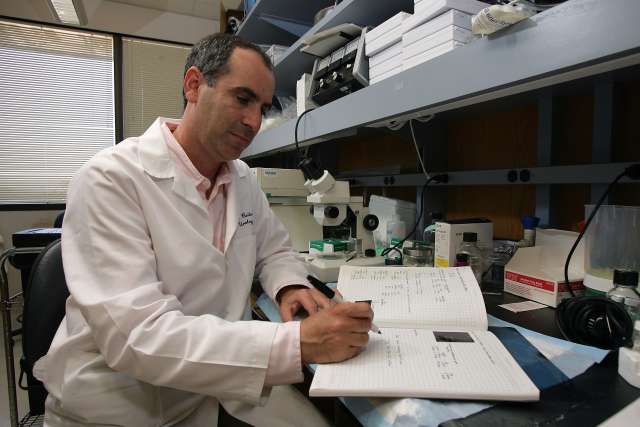Anyone with a prostate is at risk for prostate cancer — one-in-eight will be diagnosed in their lifetime — with the primary risk factor being age. Though it often develops slowly and may be confined to the prostate gland, where it might not cause serious harm, some types of prostate cancer are aggressive and can spread quickly. That is why screening and early detection are so important for treatment and management.
, is chief of the Division of Urologic Oncology and director of the UCLA Health Prostate Cancer Program at the . He talks about the disease and what people need to know.
Q: How common is prostate cancer?
Dr. Reiter: About one-in-eight individuals with a prostate will be diagnosed with prostate cancer in their lifetime. There are expected to be more than 300,000 newly diagnosed cases in 2024, and 35,000 deaths from the disease.
Q: Do we know the most common causes of prostate cancer?
Dr. Reiter: For the most part, the causes of prostate cancer are not known, but for a significant percentage of individuals, it is inherited. It’s most commonly inherited from fathers to sons, and if you have one first-degree relative affected, you have twice the likelihood of getting prostate cancer. If you have two first-degree relatives with prostate cancer, your risk is three or more times higher. So, inheritance is a big factor.
Also, the incidence of prostate cancer is highest among Black people or those of African descent, and they are more than twice as likely to die from the disease. They tend to have more advanced disease when it is found, and therefore screening early is particularly important in this population.
Q: While, broadly speaking, the specific causes of prostate cancer are not known, you mentioned genetics can be a significant factor.
Dr. Reiter: Yes, prostate cancer is probably one of the most heritable cancers there is. We think at least 50% of the cases are inherited, and I suspect as we know more, that percentage will become even higher. For example, one of the genes linked to breast and ovarian cancer, BRCA2, which is particularly prevalent among individuals of Ashkenazi Jewish descent, is also associated with the development of aggressive prostate cancer
Q: What are the symptoms of prostate cancer?
Dr. Reiter: In its early stages, prostate cancer is asymptomatic — it has no symptoms. That makes it pretty much a silent disease until it becomes advanced. If it becomes advanced, then the symptoms can include difficulty urinating, kidney failure, bone pain and bone fractures, and also things like weight loss, which we see in many forms of cancer, as well. Those would be manifestations of late prostate cancer.
Q: If there are no symptoms in its early stages, how is prostate cancer diagnosed?
Dr. Reiter: It is diagnosed generally through screening tests. The most common is the PSA blood test. In those in whom there’s a suspicion of prostate cancer because of an elevated or a rising PSA, we usually then do an MRI scan of the prostate to determine if there are suspicious lesions, and then do a biopsy of the organ to ultimately make a diagnosis.
Q: What are the stages of prostate cancer?
Dr. Reiter: There is the localized stage, in which the cancer is still confined to the prostate, which we refer to as stage 1 or 2. In stage 3, the cancer has moved beyond the prostate, usually locally, so within the region of the pelvis. Then there’s stage 4, in which the cancer is metastasized, most commonly to the lymph nodes in the pelvis, the abdomen and into bone. But once the disease has reached stage 4, it can spread anywhere.
Q: What treatments are available for prostate cancer?
Dr. Reiter: There are many treatment options, depending on the stage of the cancer. For early-stage or stage 1 or 2 disease, the standard treatments are surgery or radiation. Now there are also newer modalities such as partial gland treatment or focal therapy, where we use different types of energy to ablate, or remove, the cancer. All of these treatment options are available at UCLA.
We have something called HIFU, which is high-intensity frequency ultrasound. There’s also cryotherapy, which involves freezing, and IRE — irreversible electroporation — which involves electricity to zap the cancer. Those are the most common treatment modalities.
For disease that’s more advanced, there also are many options, starting with hormone therapy, which utilizes drugs that block testosterone, which is required for the growth of prostate cancer. And there are chemotherapy and different forms of radiotherapies. Even for advanced disease, there are a plethora of options. Individuals with this disease are living much longer now than they did 10 or 20 years ago. For many people with advanced prostate cancer, it has become more of a chronic disease than a lethal disease.
Q: Can prostate cancer be cured?
Dr. Reiter: It is definitely curable if it’s caught early. That is why we are so vocal about encouraging screening.
Q: When should screening begin?
Dr. Reiter: If you have a family history of prostate cancer, or other significant risk factors, screening should start at age 40. If there is no family history, then screening should start at age 45 to 50. The American Cancer Society guidelines recommend that if no prostate cancer is found as a result of screening, the time between future screenings should depend on the results of the PSA blood test. For example, individuals with a PSA of less than 2.5 ng/mL may only need to be retested every two years. For individuals with a higher PSA level, it should be done annually.
Because people can live with this cancer for many years, screening is not recommended above age 70 to 75.




